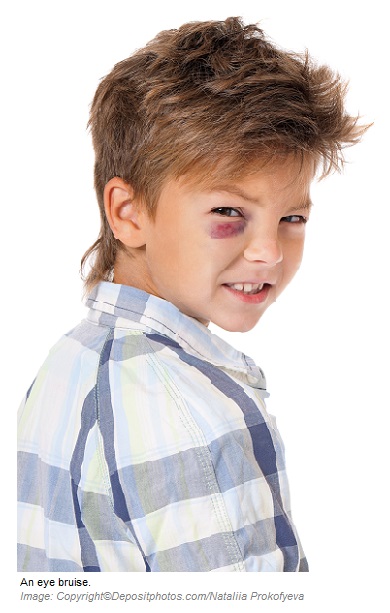Bruise is a skin discoloration caused by breaks in the blood vessels and leakage of their  contents into the soft tissues underneath the skin. It begins as a pinkish red color and progresses to a black or blue discoloration followed by a yellowish-green color at the end. The color of bruise over the course of few days is pinkish red-dark blue-yellowish green.
contents into the soft tissues underneath the skin. It begins as a pinkish red color and progresses to a black or blue discoloration followed by a yellowish-green color at the end. The color of bruise over the course of few days is pinkish red-dark blue-yellowish green.
Bruise is usually associated with swelling, tenderness and soreness. It could occur beneath the skin (subcutaneous), inside the muscles (intramuscular), or over a bone (periosteal). Contusions and hematomas are the most types of bruises.
Potential risk factors for bruise are:
- Trauma: falls, strains and sprains, pinches, blows, car accidents, and sports injuries.
- Medical conditions:
- Blood clotting disorders.
- Liver and kidney diseases.
- Blood disorders: hemophilia, leukemia, multiple myeloma, thrombocytopenia, aplastic anemia, and platelet dysfunction.
- Inflammation of the vessels (vasculitis).
- Autoimmune disease: SLE (systemic lupus erythematous) and RA (rheumatoid arthritis).
- Infectious diseases: measles, rubella, mononucleosis (kissing disease), and meningitis.
- Connective tissue disorders: Marfan`s syndrome, and Ehlers-Danlos sundrome.
- Medications: aspirin, nonsteroidal anti-inflammatory drugs (Advil, indomethacin etc), blood thinners (warfarin and heparin), Plavix, and some antibiotics.
- Child or domestic abuse.
- Insect bites.
- Chemotherapy and radiation therapy.
- Nutritional deficiencies: vitamin C, iron, flavonoids, and vitamin K.
- Food supplements: Omega-3 and ginkgo biloba.
Nutritional Supports:
Restricted Foods:
- Sugar and sweets: they interfere with the healing process.
- Saturated, hydrogenated and trans-fats.
- Processed foods.
Recommended Foods:
- Fruits rich in flavonoids: berries and citrus fruits.
- Fruits and vegetables high in vitamin C: citrus fruits, potatoes, broccoli, tomatoes, and Brussels sprouts.
- Dark-green leafy vegetables high in vitamin K: kale, parsley, coriander, Swiss chard, collards, turnip greens, mustard greens and spinach.
- Salmon.
- Nuts, especially walnuts.
- Seeds, especially flaxseeds.
Recommended Supplements:
- Vitamin C: 2 -3 grams a day.
- French Maritime Pine Bark Extract: 100 – 200 mg a day.
- Grape Seeds Extract: 50 – 200 mg a day.
- Omega – 3 Fatty Acids: 1 – 3 grams a day.
- Bromelain: 1500 mg a day. It reduces inflammation.
- Quercetin: 1500 – 3000 mg a day. It has an anti-inflammatory affect.
- Hesperidin: 500 – 1000 mg a day. It is a bioflavonoid that strengthens capillaries and increases effectiveness of vitamin C.
- Rutin: 500 – 1000 mg a day. It is a bioflavonoid that strengthens capillaries and increases effectiveness of vitamin C.
- Arnica Oil or Gel: apply topically over the bruise twice a day.
- Vitamin K: 1000 – 2000 mcg for an acute bruise for two weeks only and 500 mcg in vitamin K deficiency. WARNING: Do NOT take vitamin K if you are taking any blood thinners.
- Multivitamin: A high potency product.
Miscellaneous Suggestions:
- Cold compress in acute bruises.
- Vinegar-warm water compress.
- Comfrey cream or gel: apply topically over the area three times a day. Mucilage and allantoin are the key active ingredients in comfrey responsible for reducing inflammation and speeding up healing process.

